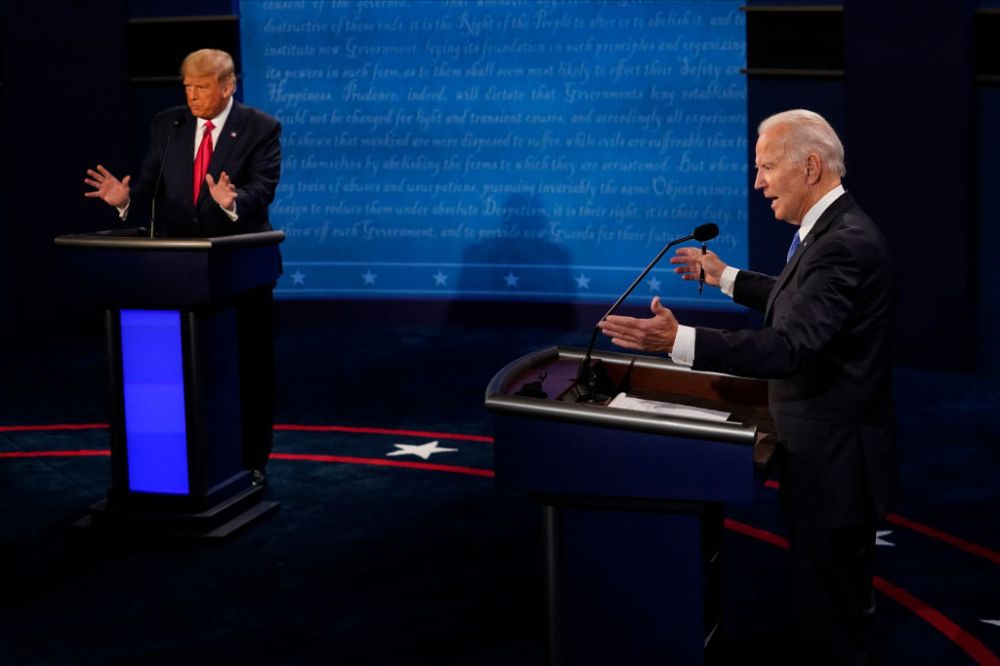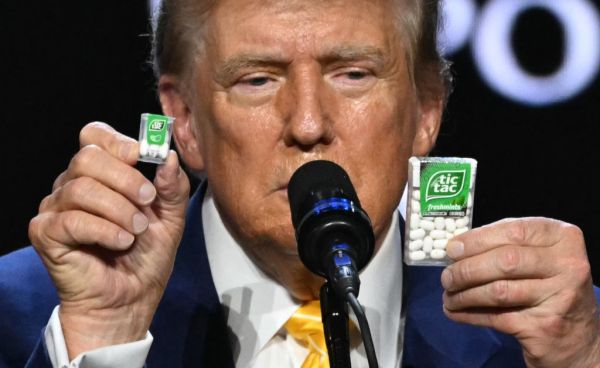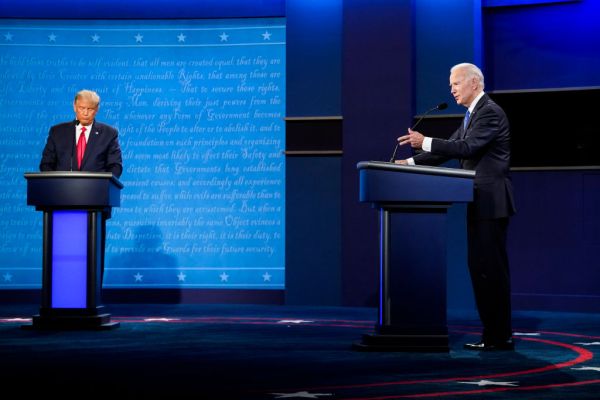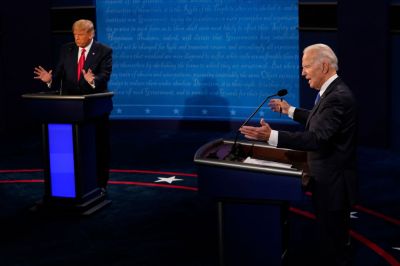As a general rule, pundits should avoid predictions—especially right before major political events.
There’s too much risk. If you blow it, you’ll shatter the illusion that you, the professional commentator, are possessed of special wisdom that your readers lack. (Never mind that the only person who harbors that illusion is the vainglorious pundit himself.)
But here’s a prediction that’s too easy to pass up: More right-wingers than left-wingers will watch tonight’s presidential debate.
It’s easy because there’s statistical evidence to support it. A CBS News poll published on Wednesday found that 69 percent of Republican voters intend to tune in compared to 59 percent of Democrats.
Right-wingers are also more confident in their candidate, giving them more reason to watch. When asked by CBS News who they thought would win the debate, 79 percent of Donald Trump’s party said he would while 58 percent of Joe Biden’s party said so of him. You can chalk that up to MAGA cult-iness if you like, but I think Democratic apprehension under the circumstances is justified.
After all, we’re essentially one age-related Biden mishap away from the election being over. If the president loses his train of thought tonight or freezes up in front of tens of millions of people, the belief that he’s the less fit for office between two very unfit candidates will be set in stone. We could plausibly see something happen onstage that effectively assures a Trump restoration, with all the angst and upheaval over the next four months that possibility would entail.
The polling for Biden over the last 48 hours has been so dire, in fact, that Democratic chieftains might quietly be hoping for a “senior moment” before the cameras to ignite support for replacing him on the ticket. Two new national surveys from respected pollsters—the New York Times and Siena College and Quinnipiac University—have the president trailing Trump by four points. Another, from Gallup, puts the instigator of January 6 nine points ahead of Biden in terms of favorability, with just 42 percent of Democrats saying they’re pleased that their party is renominating the incumbent.
If that’s not worrisome enough, election modeler Nate Silver released his first 2024 forecast on Wednesday. It gives Trump a 65.7 percent chance of winning the election.
A bad debate performance by the incumbent will make all of that considerably worse. Which brings me to another easy prediction: Among Americans who do end up watching, many more Democrats will do so with their fingers over their eyes than Republicans will.
Given the lengthening odds of a Biden victory in November, his advisers might be smarter to spike his pre-debate coffee with downers rather than uppers. Having him fall asleep at the podium would be just the thing to get the “Michelle Obama 2024” bandwagon rolling at full speed.
On that note, let’s talk about drugs. And no, I don’t mean the ones I’ll be taking to get through this miserable spectacle.
The traditional way to set expectations for an opponent before a debate is to talk up their oratorical prowess. The higher that bar is set, the more likely it is that a middling performance will be seen as a failure.
The Trump movement doesn’t do expectations the traditional way, as we recently had reason to explore. But the candidate himself is elderly enough that the traditional way of doing things was destined to seep into his approach a little.
Last week, for instance, he paid Biden a rare compliment during an appearance on the “All In” podcast. “I assume he’s gonna be somebody that will be a worthy debater. ... I don’t want to underestimate him," Trump told the hosts. “I watched him with Paul Ryan [in the 2012 vice presidential debate], and he destroyed Paul Ryan. Paul Ryan with the water, he was chugging water left and right … and he beat Paul Ryan.”
Trump being Trump, that answer was motivated at least as much by hostility to Ryan as it was by an effort to raise expectations for Biden. But there was strategic logic to it: After many, many months of Republicans deriding the president as demented, the party will find itself in an awkward spot if Biden appears conspicuously not demented at Thursday’s debate.
“Actually, he’s always been a strong debater” is one way to try to head that off. But it’s not very convincing given the right-wing cacophony about Biden’s cognitive struggles.
That’s where the drugs come in.
Dave Weigel of Semafor remembered something I had forgotten: accusing opponents of substance use before a debate is as much of a Trump tradition as whining about fraud when he or his candidate loses a race. He did it to Hillary Clinton in 2016, then did it to Biden in 2020. Neither stuck in my memory, probably because in neither case did the Democrat seem so enfeebled that Americans might be tempted to seek an ulterior explanation if either performed well.
That’s no longer so in 2024.
Another thing that’s changed since Trump pulled this stunt eight years ago is his domination of the American right. In 2016, it was still politically safe for an elected Republican to roll their eyes when he accused Clinton of being hopped up on goofballs. But in 2024, advancement within the GOP requires Trump’s favor—and the surest way to earn that favor is to impugn his enemies personally, ideally in the same terms as Trump himself.
Biden’s senescence, Republican cult-iness, and Trump’s urgent need to reset debate expectations for the president all help explain the astonishing extent to which “Biden’s on drugs” has become a talking point across the populist establishment this month.
Trump himself has led the charge, accusing Biden of intending to get “jacked up” before the debate by doing cocaine or receiving “a shot in the ass.” He also publicly challenged the president to a pre-event drug test.
That’s all par for the course for Trump. What’s different this time is the volume of sycophants amplifying that message. There are the usual suspects in the dregs of right-wing media, of course, like Sean Hannity. But once and future White House adviser Stephen Miller is in on it too, baldly asserting that the president being “heavily medicated” for the debate will pose a threat to national security. “Remember: If you see Biden bizarrely shouting, not blinking, and slurring while fast-talking tonight it’s because he’s on drugs,” Miller warned MAGA true believers on Thursday.
Then there’s Congress, where an informal competition has broken out among Republicans to see who can produce the most colorful description of Biden’s alleged drug habit. The more dignified (or less imaginative) among them accused the president of being on “something,” as Rep. Mariannette Miller-Meeks put it, or on “performance-enhancing drugs,” in the words of Rep. Ronny Jackson. Rep. Nancy Mace specifically mentioned Adderall, and Rep. Eric Burlison name-checked “Mountain Dew or whatever it is,” which may or may not be a euphemism for something more potent and illegal.
Then came Rep. Andy Ogles, who put them all to shame by proposing to legislate on the matter:

Through a herculean blunt-force publicity effort, it’s now received wisdom across much of the grassroots right that if Biden sounds coherent at the debate it can only be because he was smoking meth or what have you in the green room.
In various ways, “Biden’s on drugs” strikes me as almost the platonic ideal of MAGA political messaging. And the funny thing is, Trump almost certainly doesn’t need it to win tonight’s debate handily.
One populist hallmark of the “drugs” talking point is that the dearth of evidence to support it is no impediment to its popularity. If you still believe that the 2020 election was rigged after four years without proof, you’ll have no trouble believing that the president is snorting super-blow that briefly turns his mind into a steel trap.
No such drug exists, needless to say. Many substances raise alertness, of course, but the rap on Biden is less about low energy than that his aged brain can’t sustain coherent thought anymore. There’s no fix for that, alas. Certain medications “can perhaps make an individual more alert, but quite often that can just exacerbate their confusion, as well,” one Alzheimer’s expert recently told the Washington Post. “They can be more stimulated, but they are not going to be behaving in a more cogent or normal fashion as a result of being stimulated by anything. Very often it’s the reverse.”
“Biden’s on drugs” isn’t even coherent on its own terms. If the White House has access to a miracle drug that will temporarily restore the president to perfect lucidity, why isn’t he taking it every day?
Another textbook populist characteristic of this critique is that it’s conspiratorial and unfalsifiable.
Because Trump’s supporters (like their counterparts on the other end of the horseshoe) have adopted a childish good-versus-evil quasi-religious narrative of politics, it’s inconceivable to them that they might lose a political battle fairly. They represent The People against a malign establishment; their champion is an invincible savior-hero. If their side loses an election or a debate—or a criminal trial—there must be some nefarious explanation that accounts for it.
It was rigged. The other side illicitly enhanced its performance. There is no such thing as a legitimate victory for the bad guys.
The MAGA movement will never take accountability for their own failures and mistakes, like setting the bar of expectations for Biden on the ground by relentlessly accusing him of having dementia. So if he overperforms tonight, it’s Democratic chicanery that did it, not their own misjudgment about his cognitive abilities.
There’s even a bit of projection in accusing Biden of being on drugs, as there usually is whenever the populist-in-chief starts ranting about his enemies.
An attempt to rig the 2020 election did occur, after all, it’s just that the alleged victim turned out to be the perpetrator. There is a “fake news” media, but the fake-iest fakers tend to come from the pro-Trump right. And for all the hype about the “Biden crime family” and Democrats being “soft on crime,” only one candidate on the stage tonight has been convicted of a felony and stands accused of numerous others.
The dirty little not-so-secret about drug problems at the White House is that it was the aforementioned Ronny Jackson, who served as presidential physician before becoming a loyal Trump toady, who reportedly turned the West Wing into a pill factory under Barack Obama and Trump. “Jackson used his proximity to both presidents to build influence by dispensing medical care and drugs without proper procedures,” the Washington Post reported earlier this year. One whistleblower alleged that Jackson was known to some as “Candyman” and “Dr. Feelgood.”
If Trump had or has any problem with that, there’s no evidence of it in his subsequent political support for Jackson. And for the record, the last time these two candidates debated, one of them did have a dangerous foreign substance in their body. And it wasn’t Biden.
There are other populist attributes to the “Biden’s on drugs” attack—it’s gleefully lowbrow, for instance, all but reveling in its lack of decorum—but here’s one more worth elaborating on: It’ll probably work.
A few weeks ago, I considered the difference between how Republicans went about political messaging before Trump and after. In the pre-Trump days, the GOP would take events as they came and try to spin them in a favorable way, as normal political parties do. “Joe Biden is actually a good debater” would have been a common talking point for months before the debate.
In the Trump era, the right creates its own reality and uses the informational tools at its disposal to encourage and enforce conformity to it. In a normal party, turning on a dime from “Biden is a vegetable” to “Biden’s drug use made him unbeatable” would cause intellectual whiplash. But in the childish cult of personality Trump has built, there’s no tension between the two. Biden must be a vegetable, and so an otherwise inexplicably strong debate from him must just as surely be attributable to some secret real-life version of the drug in Limitless.
It’s perfectly straightforward. What other explanation could there be?
Remember, propaganda doesn’t concern itself with what’s true, it concerns itself with what’s useful. Much of Trump’s party has been conditioned to view information about politics that way since 2016, and it’s obviously more useful for him and them to believe that Biden performed well due to mysterious chemical enhancement than that he’s simply not as senile as they cracked him up to be. So that’s what they’ll believe.
And those millions of swing voters who’ll actually decide the election? They’ll watch the debate, having been bombarded with weeks of smears about drug use. And if Biden sounds sharp, they’ll wonder.
Drugs won’t be the only theory we’ll hear from Republicans to explain the debate’s outcome if the president does well, of course. Caterwauling about liberal media bias at CNN has already begun, partly as a way of “working the refs” to go easy on their candidate and partly to lay the groundwork for scapegoating the network if Trump performs poorly. “I’ll be debating three people instead of one half of a person,” Trump said recently, referring to moderators Jake Tapper and Dana Bash. Even the unknown network engineer responsible for muting the candidates’ mics is preemptively under suspicion.
But the simple truth is that it should be trivially easy for Trump to win this debate.
I’m not saying that to raise expectations for him, only to point out that he might plausibly have the easiest task before him that any presidential candidate has had at a modern debate. Trump is facing a historically unpopular incumbent who could blow up his own campaign at any moment by betraying an alarming sign of advanced age. And the former president is armed with nuclear-grade political ammunition in the form of inflation not seen in decades and a border crisis not seen in … ever.
Literally, all Trump has to do is sound normal for 90 minutes. That’s it.
I realize this is no small thing to ask of him, but even Trump can’t screw this up (I think). All he needs to do is dependably steer his answers back to immigration and the cost of living. When Biden brings up January 6 or his criminal conviction, he should demur and insist that he’s keen to talk about America’s problems, not his own. When he’s asked whether the 2020 election was rigged, and he will be, some elaboration on “maybe it was, maybe it wasn’t, but I’m focused on the future now” will probably suffice.
He’s already positioned himself strategically for the abortion segment, having washed his hands of that issue months ago by punting it to the states. And he seems to understand that being cruel to Biden by mocking his addict son will hurt him more than it’ll hurt the president—emphasis on “seems to.”
Apart from their answers on a select few issues, which favor Trump, neither candidate will be judged tonight on their policy acumen. They’ll be judged on their relative fitness for office, and the public is already primed to believe that Trump is marginally more fit than his sundowning opponent. If he seems sober and serious—again, no small thing to ask—I think he wins the debate. Heck, even the inevitable clash between the candidates about the future of democracy favors him in this country of imbeciles.
The only way he can lose is if he goes off on a tangent about sharks or boasts about black people liking him now because he’s a criminal or commits a felony onstage. Frankly, given the current state of American decline, another felony might end up extending his lead in the polls.
Tonight is the acid test for Democrats’ theory that the electorate has been slumbering and will awaken to the threat Trump poses to the constitutional order once it gets its first strong dose of him in four years. I’m skeptical, and will be more skeptical if he manages to sound not-insane for an hour and a half. My risky prediction: He wins. And tomorrow, the Democratic panic begins in earnest.







Please note that we at The Dispatch hold ourselves, our work, and our commenters to a higher standard than other places on the internet. We welcome comments that foster genuine debate or discussion—including comments critical of us or our work—but responses that include ad hominem attacks on fellow Dispatch members or are intended to stoke fear and anger may be moderated.
With your membership, you only have the ability to comment on The Morning Dispatch articles. Consider upgrading to join the conversation everywhere.